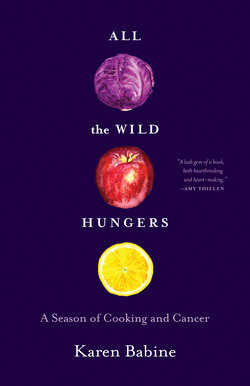Читать книгу All the Wild Hungers - Karen Babine - Страница 15
Оглавление7
THEY BROUGHT FOOD ON Tuesdays, because chemo happened on Mondays. Later, when my mother was regularly hospitalized for those 100.4 fevers, they rang the bell on Thursdays, too. The beeps and bells of the house were startling in such silence—the tri-beep of the thermometer a clear signal from down the hall that my mother was awake and checking for fever, the doorbell that set the dog to barking. Taking my mother to the emergency room became so commonplace in those days that we had a bag packed and ready near the door with her noise-canceling headphones, face masks and eye masks, her Kindle charging cords, and everything else she would need for an overnight stay. It was a mantra in those days—you have two hours to get to the ER, no excuses. The chemotherapy destroyed her white blood cells as well as her neutrophils, the baby white blood cells, and she was incredibly susceptible to infection. It was a terrifying way to begin treatment.
Our friends balanced hot lasagna, cold vegetables, yeasty bread that made bright steam in the dark winter air. They brought pork roast, beef roast, squash, potatoes. They rang the bell and offered their first vegetarian-cooking efforts, unnecessary apologies turning breath to laughter as they stood in the doorway. Nobody tells you how lonely cancer is, the fear of it hardening your skin into a shell as you watch your mother suffer with her bellyband after surgery, knowing that even when she can bend to tie her shoes, when she can take a shower without supervision, when she is permitted to lift her two small grandchildren, it will be less of an achievement and more a signal to proceed with the next terrible stage of treatment. When they talk about the cumulative effect of chemotherapy and radiation, they don’t talk about the cumulative effect on the family: each stage takes longer for us to recover from, too.
In Greek, the practice of hospitality is called xenia, but more broadly it is the practice of showing kindness to strangers who appear on your doorstep and may or may not be gods in disguise. It is the hidden face, the unknowing, that is important: It does not matter who rings your doorbell. It could be anyone, or Anyone. For the Greeks, their religion now largely lost to myths of gods and Titans, xenia was about navigating a world where their gods did not live lives separate from them, a world where we find the divine in an ordinary salad of cucumbers, tomatoes, and onions on a Tuesday night, a moment where the individuality of cancer meets a community who will not let you walk this path alone. Maybe community is a myth, in the way that fetal microchimerism makes me wonder if individuality is a myth. Can it be Schrödinger’s tumor, both and neither? Is that why we need myth, why we need metaphor, to cover the space of uncertainty? Why we need to consider the Greek practice of xenia, hospitality to the stranger who may or may not be the divine in disguise?
